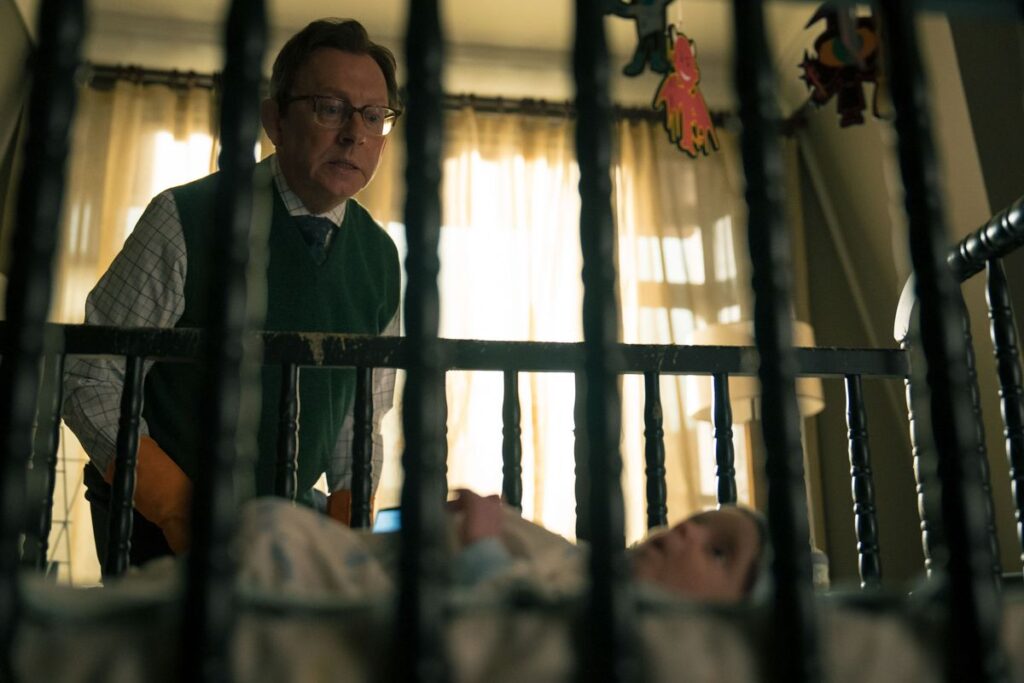Michael Emerson loves to laugh. He does it frequently, when he makes an observation that is interesting to him, as if a pleasant or provocative thought is his favorite kind of amusement. It’s only really fucking creepy because he just happens to have built a career out of playing some of the most affecting TV villains of the last 20 years.
This is only amplified by Emerson’s current role as Dr. Leland Townsend on the Paramount Plus series Evil. Initially a manipulative forensic psychologist, Leland is eventually revealed to be in the employ of what seems to be literal demons, and in the latest season, committed to bringing about the birth of the Antichrist. For the viewer, Leland is perhaps some of the most fun you can have watching a bad guy on TV, and that, according to Emerson, is very much by design.
Recently, Emerson got on a call with Polygon to discuss the delight of playing such a delectable villain, the nature of evil, and the many substances he’s been doused in while working for demons. He also laughed a lot. I tried not to hold it against him.
Polygon: You have a (Antichrist?) baby to take care of this season, which adds another layer to this role’s rich tradition of covering you in substances.
Michael Emerson: It is a messy part to play.
Photo: Elizabeth Fisher/Paramount Plus
What’s the messiest thing you’ve done so far?
That moment where I’m working at the computer and the baby’s in the bassinet and projectile vomits from off screen on me. That pea soup, which is what it was, it came out of an air cannon and some of it went deep into my right ear. So it was days before I actually went to one of those street corner walk-in med clinics and said “Could you look in my ear? Because I’m afraid I’ve got something in there that may be, you know, fermenting.”
That also sets up one of my favorite recurring Leland bits, where something that starts as a gag, like the baby annoying Leland, is solved in a very sinister way.
And then one thing leading to another. Once he realizes that Kristen’s voice is calming to the child, then he has to play all of her tapes. And in those tapes, she reveals her secret fears and desires. And then that’s raw material for him.
That was horrible! That plot to hypnotize Andy to kill his own daughter. But it’s a beautiful turn when even the hypnotized Andy can’t bring himself to do it.
You’ve said previously that you developed a taste for being a villain that is an audience favorite. Is it easier to do that than it is as a more heroic protagonist?
Well, it’s not a goal I set for myself, but I do think there’s more fun and more opportunity in playing a character that is, I’ll say, an irritant to the audience. Because I think they clench up a little bit and pay attention when I come on, you know?
The writers on Evil have really served me well, as I hope I do them. By giving me these ambiguous situations, and letting me sort of decide what the best — by that I mean worst — tone of delivery might be. So when I’m hypnotizing Andy, I thought, [speaks softly] Oh, this should be like a lullaby. This should be, this should be so sweet. Butter would not melt in Leland’s mouth. It’s all so reasonable. It’s just what he has to do. Yeah. And then everything will be fine. [cackles]

Elizabeth Fisher/Paramount Plus
I love that sound! Because it says he’s playing strategies. And his tone is counter to his intent. These are things you learn, I would say, as I have done a hundred times, that I got from playing Iago a number of times in Shakespeare’s Othello. Because there’s a character who insists that the audience warm to him. If you own that character on stage, it speaks directly to them. And then they become complicit in his villainy, because they rather like him. Despite his behavior.
Do you think Leland is scary because he thinks the world is black and white, and he’s firmly in the black?
Well, he’s scary because he seems to be without remorse, without misgiving. He rather revels in the mischief it makes. He also blurs the question that we have in our minds these days of, is evil an entity unto itself? Is it just an accumulation of bad and self-serving choices made by human actors? Or is it something beyond human? Is it some essence or vibration or electromagnetic force or something like that? So Leland is there for us to say, Oh, look, it’s this bad actor, who’s he working for? How was he recruited? Who runs the evil in the world? And I think that’s the conversation that the Kings [Evil creators Robert and Michelle King] are promoting.
Do you have questions for the Kings about how literally you ought to play a certain scene? You share several scenes with a giant demon.
The first time I played with the giant demon, it was shocking to come on the set and be confronted by him. But then I thought, All right, how are we going to play this? The audience will find it strange and fearful. But for Leland, this is just a co-worker, or possibly a supervisor. And he’s long over this character, regardless of what he looks like, or what powers he may have. So it’s just an everyday annoyance to be with these demons. But you have to put up with ’em, because they’re in charge.
I was happy to play that angle of it. Because in a way, by demystifying the moment, it makes it weirder, and more scary to someone who’s not Leland — that we can, in some way, come to be at peace, and on friendly terms with patent evil. And of course, that’s a question in the zeitgeist of our moment. [chuckles]
New episodes of Evil season 4 drop on Paramount Plus on Thursdays.

